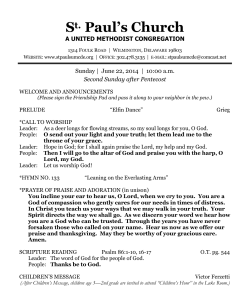
How to Pray When You Feel Worthless
How to Pray When You Feel Worthless Well next week we officially begin our series in the book of Hebrews. But today we have one final topical sermon before we do that and the title of the message today is “How to Pray When I Feel Worthless.” Our church focus for the year is on prayer. As believers we are instructed to pray. We are instructed to bring our petitions to the Lord to pray without ceasing....We know these things, and yet there are times when we just don’t feel like praying. And there are lot of potential reasons to why this might be the case in your life, but the one we are going to be focusing on today is this feeling of worthlessness. I have lost hope in prayer because I look at myself and all I see is a sinful human who makes the same mistakes over and over again and seems to make zero progress in the Christian life. I feel like prayer doesn’t even work for me or something. The thought of praying just kind of rings hollow. I just feel exhausted in the faith. The harder I try the more depressed I get when I look inside. Perhaps you listened to last weeks message on application and you thought to yourself, “You know what, I haven’t actually put in any effort whatsoever to change in the last year. I am pathetic.” Perhaps you have thought to yourself, “Man, I ought to be further along in my walk with the Lord by now. I am a fat cell in the body of Christ.” I committed to changing last week and now here I am one week later and I haven’t changed a bit. I am lame. And this feeling of spiritual inadequacy can have a very draining effect of your life. You can start to question your salvation. You might describe it as spiritual depletion. There is a dissatisfaction with where you are and where you think you should be. This is how one person put it in a letter that I received.... I have had great prayer times and fruitful times in the Word, but they are few and far between. To be honest, I can go weeks without doing either of those to any great extent and when I do, it is out of a feeling of duty and guilt. Of late, I have had an undeniable lack of reaction to the Word. I can’t help but feeling I am reading because I have to and that I am only reading over and over the things I have known for so long. The Word has felt dry and redundant to me when I have quiet time. As for prayer, when I have the rare opportunity to be alone and pray intensely for a long time, it can be good. But I lack a daily, consistent prayer life almost completely, and almost always have. I have felt a need to get more involved, but immediately recognize a wrong motive (looking like a good Christian) behind most of my plans. I am at a complete loss because everything in me wants to say that this is on me, God has done His part and has equipped me fully to live in holiness and to love Him with my whole heart, but I have dropped the ball. I MUST read more and I MUST enjoy it and grow from it. I MUST pray more. I MUST reach out more and MAKE myself love the lost. I MUST get out of my comfort zone and face persecution, challenge. I have this whole list of things I know I MUST do better, but history has proven to me that I can do no better than I have been doing on my own. Not only this, but picking myself up by my bootstraps to be a good Christian just violates everything I believe about my own hopeless sin and reliance on grace. I know it has to be a work of God and that He must continually work in our lives to change and grow us. So how do you pray when you feel like this? Is there something that I am doing wrong or thinking wrong that is causing things to be so difficult? What do I need to do different? This is a question every honest Christian has in his or her life at some point. Well today we are going to be talking about a passage of Scripture where we read of a man who had significant failures in his relationship to God. Seriously significant failres. In fact his failures more than likely eclipse your failures by a significant amount. But here is what we are going to learn from him today. Those failures did not prevent him from coming to the Lord and asking the Lord for blessing. In fact, there is a kind of strange confidence that we are going to want to emulate in this man. Today we are going to look at the passage about the thief on the cross as a most excellent example of the attitude required to come to the Lord in prayer. And at first you might think, what does this story have to do with prayer? The thief doesn’t pray a single prayer on the cross. How is this going to help us in the least bit? But the parallel is not very hard to see if you take a second to think about it. If you are a living in the 1st century and you want to open your mouth and talk to Jesus or if you are living in the suburbs of Boise, ID and you want to get on your knees and talk to Jesus, the attitude required to do both of these things is the same. It is exactly the same. And there is a certain attitude we want to extract from this thief that I am praying will be very instructive to us this morning especially as it relates to prayer. But before we get to that scene we have to back up a moment and remember the scene. Jesus had eaten the last supper with his disciples Thursday night. After Judus had slipped out to betray him, Jesus and his disciplies slip into the Garden of Gethsemene for prayer. Jesus cries out to the Lord in extreme anguish that the father would remove the cup from him, but, not my will be done....but yours. After several long hours of prayer and after enduring the agony of waking his sleeping disciples, Jesus is arrested by the Roman soldiers and drug before the religious leaders in an illegal mock trial until daybreak. By now he is undoubtedly exhausted. His disciples have abandoned him. Peter has betrayed him. Pilates sentences him first to a floggin and then to be crucified. He painfully marches outside the city bearing the timber upon which he would soon be crucified. And we will pick up the narrative in verse Luke 23:32. 32 pTwo others, who were criminals, were led away to be put to death with him. 33 qAnd when they came to the place that is called The Skull, there they crucified him, and the criminals, pone on his right and one on his left. 34 And Jesus said, “Father, rforgive them, sfor they know not what they do.”2 And they cast lots tto divide his garments. 35 And uthe people stood by, watching, vbutwthe rulers xscoffed at him, saying, y“He saved others; zlet him save himself, aif he is bthe Christ of God, chis Chosen One!” 36 The soldiers also mocked him, coming up and doffering him sour wine 37 and saying, e“If you are fthe King of the Jews, save yourself!” 38 gThere was also an inscription over him,3 “This isfthe King of the Jews.” 39 hOne of the criminals who were hanged irailed at him,4 saying, “Are you not jthe Christ? Save yourself and us!” 40 But the other rebuked him, saying, “Do you not fear God, since you are under the same sentence of condemnation?41 And we indeed justly, for we are receiving the due reward of our deeds; but this man has done nothing wrong.” 42 And he said, “Jesus, remember me kwhen you come into your kingdom.” 43 And he said to him, “Truly, I say to you, today you will be with me in lParadise.” You may have a hard time articulating it, but when you read this story you can certainly sense a certain beauty. And there a lot of things we can learn from the thief on the cross, but I want to redraw the connection that we are making here today. Here’s a man who is about as sinful as they come. They just don’t get much more ugly than this. And yet he comes to Jesus. He draws near to him with affection. And he receives grace! That is what we are trying to learn how to do. We feel sinful. We feel broken. We feel our performance is subpar and we want to learn from this thief how to draw near to God when our life is a mess of contradictions. And this thief is such an outstanding example of this....I am so thankful to God for this thief! Why, because from an objective point of view, the thief is much worse than many of us. He has resisted God longer than us. He made far worse decisions in his life that most of us. Historians tell us that in order to be on the cross he was very likely a seditionist or an assassin of some kind. We remember him as a thief, but that was probably the least of his crimes. This guy was a hardened criminal in many senses. Now compare the thief’s sin with yours. He just got done slitting some guys throat and is hanging on a cross. You’re having a hard time reading your Bible. Let’s keep things in perspective here. This guy is guilty of some pretty serious sin. But even though the spiritual performance of the thief is horrific, he does not appear to struggle with the same things we struggle with. He does not seem to struggle with his spiritual performance getting in the way of his willingness to communicate with Christ. There is something he is doing better than we are. And it is precisely that thing that that we need to focus on today. So what is it? How is the thief different than us? What is that secret ingredient that allows him to approach the Lord without hinderence? There are actually two things this thief does very well and we are going to look at both of them. But see if you can guess first....Here is a hint. Think about it. ● His hands are outstretched on a cross and he has no ability to move because huge spikes are crushing his bones to the beam ● His death is sure and immanent. Within hours he will surely and certainly be dead. The Sabbath is fast approaching and he knows beyond a shadow of a doubt that the Pharisees are not going to allow dead bodies hanging around during the feasts. They will break his legs before sunset. ● He has nobody left to impress. All his “friends” have deserted him. ● He has nothing in terms of an identity. Normally we find identity in something we do or accomplish. But if you are hanging on a cross at the mercy of the jeering crowd, when your clothing gets stripped away, your identity pretty much goes with it. ● He has made a complete mess of his life and he knows it. ● In short, he has hit rock bottom and he has nothing to loose. You want to know what this magic ingredient that the thief has that allows him to come to the Lord without hinderence.....we so frequently struggle with? Here’s the first one.... Ready to Receive Grace The thief is ready to receive grace. When we are ready to receive grace, it is then and only then God can help us. You might be incredibly thirsty and the water fountain might be turned on, but you can’t get a drink if your cup is turned upside down. There is certain attitude that is the spiritual equivalent to “turning the cup.” In every case of spiritual stagnation that I can think of it is our pride that is preventing us from growth. It is pride that is blocking the help that we need from the Lord. Pride is like a cork which plugs up the fountain of grace. Now we have to stop quickly here and do some explaining. At first this may seem a very insensitive thing to say to a person who is struggling with spiritual exhaustion. It may seem very cruel and uncaring to say, “The problem is you are a very proud person.” How in the world is this going to help? ...The last thing you want to do is just discourage a person who is struggling with spiritual performance and say, “Listen the problem is you are not PERFORMING. Be humble. Work harder. Be better. Yes, here is another thing you are failing at. You are proud failure.” That typically is not very helpful. But, when viewed correctly (that is to say biblically) this can be a very exhilarating truth. The key to seeing this as good news rather than bad news is to realize that humility is infinitely easier than pride. Pride is an exhausting effort to project an image. It is building a house of cards in a windstorm. Pride is the spiritual equivalent of running up all your credit cards and projecting the image that you have wealth when you really have nothing. The picture we need to have in our mind of a proud man is a man who is holding onto a long rope thrashing around trying to hang on. His strength is failing and he is sweating from the exhaustion of trying to hold on. His identity is wrapped up in his performance, but he can’t do it forever. Eventually he is going to tire, but the thought of it keeps him gripping. The thought of admitting that he is weak keeps him fighting like a caged animal. Now contrast that to humility. Humility is not something you even have to do. Humility is a soft surrender. It is open admission of weakness. You know what humility is? Humility is just letting go! What could be easier than letting go? Here is a thought that is truly liberating. What is keeping you from seeing Christ and what is keeping you from following hard after Christ and obeying Christ and praying to Christ is your irrational desire to exhaust yourself by clinging to that silly rope. All you have to do is let go. That is actually a very liberating thought. So let go. And what that actually means in practical terms is stop finding your identity in things you do. ● Just admit you are so impossibly lame. ● Just admit you can’t do anything. ● Just admit that everything you know is a result of others teaching you and that you haven’t had an orignal thought in your life. ● Just admit that all the money you have is God’s and that he gave you every opportunity you ever had to make it and he gave you the skills you need. ● Just admit that those things that make you unique and individual are gifts, they are gifts given to a crucified criminal who needs someone to pry the nails out of his hand so he can reach out his hand to even accept it. ● Just admit that all your sins need God’s grace. We can learn so much from the crucified criminal. He is a good friend of mine in the Scriptures. Now what is going to prevent this from turning into licentious living? Is it okay to just be lame? Is it okay to be rebellious and have weak affections for Christ? Is it okay to just kind of accept our weakness and just apply minimal effort to change? Is it okay to simply admit defeat as a polluted soul and adopt a weak mode of existence that casually applies an apathetic damage control. Why don’t we just sin that grace may abound? I’ll take grace handouts as long as you are offering them. Isn’t the surrender of self-effort also the surrender of any sort of progress in the Christian life? This leads us to the second thing we can learn from the thief. Reaching rock bottom can be a form of humility, but it can also be nothing more than humiliation. Remember there were two thieves on the cross. One was humbled and was transformed into a humble man. One was simply humiliated yet remained a proud man. There is a form of receiving grace that is not humble. I am quite sure the other thief on the cross would have received a free pardon for his transgressions and would have walked away from his sentence just as proud as the day he was captured. So it is not simply hitting rock bottom, it is not simply receiving that transforms us into something different. That is not the definition of humility. The key to truly being humble is the forgetting of self. And there really is only one way to actually forget self. And that is to behold something greater than yourself. This is the second thing we learn from the thief on the cross. The thief saw the person of Jesus and the shocking confrontation changed him at his core. The Forgetting of Self in Worship One thing that is interesting when we do a harmony of the gospels is that we discover that at the beginning of that crucifixion both of the criminals were hurling insults at him. At first our thief was unconvinced. At first he was ready to take out his anger on Jesus and extract whatever meager pleasure he could at someone else’s expenses. But something happened. The thief was actually saved while hanging on the cross. What was it that caused him to have such a radical change of mind. The text does not say specifically, but I don’t think we are overstepping our bounds by any means to guess at the main reason. It was the sight of our great Lord and Savior Jesus Christ! ● Undoubtedly this man had heard of Jesus and he knew why he was being crucified. He was being crucified for claiming to be the king of the Jews. Even if he didn’t know it before he would have a certainly known it now. After all there was a sign hanging over his head that said, “King of the Jews.” ● And I am sure the criminal is thinking to himself, “Big claim....Messiah huh? I’ve seen your type before....” But what he had never seen before was how THE Messiah would respond to those around him. ● Men and women weeping and Jesus’ response to them as they weapt. ● The self-forgetfulness of Jesus as he considered Mary and the women around the cross. ● Imagine how startled he would be to watch the nails pound into his hands and feet and hear the words of Jesus, father forgive them for they know not what they do. I am quite sure he was struck with this man’s character. It was if he was seeing a new form of manhood that he never thought possible. Something about Jesus had to grip him profoundly, because, think about it....this thief has every reason to doubt. This Jesus is dying on an instrument of shame and torture. If ever there is a picture of a powerless man, if ever you have laid your eyes on a man who was powerless to save, if ever you were able to look at the embodiment of weakness and inability, it would be a man nailed to the cross. ● Even the disciples forsook him and fled, Peter denied him, Judus sold him... ● Nobody else was confessing him as Lord that moment. And yet the thief worships! He sees something in Jesus. I can imagine him saying, “I have no idea what that thing is....but I want it. I will do anything to get it. I lived my entire life to find this. This is something, someone wholly other.” The character of Jesus had a softening effect on his spirit. And you know he experienced a breaking at some point....the same breaking we all experienced when we came to know Jesus. ● And can it be? That I should gain an interest in the Savior’s blood? ● Why would he do this for me? ● I am not worthy. How can he know me and still love me? Spiritual laziness that is not concerned with holy living has lost connection with the marvel of our Savior. We will never abuse grace if we truly know the person dispensing it. Because knowing the person changes you. Here’s an example that might help. Why is it inappropriate to stand up in the middle of a wedding an interrupt the minister and make a joke? Because there is something really serious at stake. But it’s not just an inanimate thing...there are people that are constraining your behavior. The family members in the room and the people who are getting married have an influence on how you carry yourself. And in a very similiar way, those who see Jesus, who are astounded by the character of the one they worship...they forget themselves. It alters their behavior. They are different people. One of the best indicators of whether Jesus has made this kind of impact is to look at your affections. Are you moved at the emotional level by what Jesus has done for you? Are moved deeply in your affections for Christ. Here’s a quote in this regard from Jonathan Edwards who was used mightily by God during the great awakening: A person who has knowledge of doctrine and theology only – without religious affection – has never engaged in true religion. Nothing is more apparent than this: our religion takes root within us only as deep as our affections attract it. There are thousands who hear the Word of God, who hear great and exceedingly important truths about themselves and their lives, and yet all they hear has no effect upon them, makes no change in the way they live. The reason is this: they are not affected with what they hear. There are many who hear about the power, the holiness, and the wisdom of God; about Christ and great things that he has done for them and his gracious invitation to them; and yet they remain exactly as they are in life and in practice. I am bold in saying this, but I believe that no one is ever changed, either by doctrine, by hearing the Word, or by the preaching or teaching of another, unless the affections are moved by these things. No one ever seeks salvation, no one ever cries for wisdom, no one ever wrestles with God, no one ever kneels in prayer or flees from sin, with a heart that remains unaffected. In a word, there is never any great achievement by the things of religion without a heart deeply affected by those things - Jonathan Edwards, Religious Affections The thief on the cross was affected by Jesus. His affections were greatly moved. He let go of the rope and he was ready to receive grace. The Naked Gospel Let’s try and summarize what we are saying here. We struggle with coming to God because we feel that we are living a hypocritical life. We struggle coming to God because we feel that our failure and weak spiritual performance is an indicator that we are not walking according to the spirit. We struggle coming to God because we feel guilty that he has given us so much and yet we spurn that grace and continue to live in disobedience. I am still the angry person I have always been. I am still the impatient man I always was. I still am short and covetous and unfriendly. I am not a good Bible student. I don’t pray like I should. What should I do? Do what the thief did. Come. Here’s one last angle that I hope will be helpful... I’ll bet that most of you would feel uncomfortable with the following statements. ● Jesus does not care how you live your life. He loves you just as you are. ● You can live the rest of your life and never change an ounce and Jesus will love you just the same. ● Jesus accepts you and loves you and died for you regardless of how you have lived or how you will live. Why do these statements make us feel uncomfortable? Because we know that true saving faith results in a changed life. But, don’t let your desire to protect the abuse of the gospel take away its power.... I was reading a sermon this week by Charles Spurgeon, and I ran across something he read that just froze me in my mental tracks. He said this: Many good people think they need to guard the gospel; but it is never so safe as when it stands out in its own naked majesty. It wants no covering from us. When we protect it with provisos, and guard it with exceptions, and qualify it with observations, it si like David in Saul’s armor: it is hampered and hindered, and you may even hear it cry, “I cannot go with these.” Let the gospel alone, and it will save; qualify it, and the salt has lost its savor. When you hear the gospel say, “God loves you despite what you have done, and despite what you will do... “ This is when you change... You may have forgotten that this was actually a sermon on prayer. I thought about trying to preach an entire message on prayer without using the word because so frequently we have wrong ideas in our mind about what prayer is. Prayer certainly takes the forms that we are familiar with. The scriptures speak frequently of group prayer and private prayer. Jesus got away and prayed all night on several occasions. These are all forms of prayer, but before any of that there is an attitude. There is attitude and spiritual posture that under girds everything we do in prayer. And here it is: Desire for God is the heart of prayer. Application Homework: 1. Resolve this week to abandon your resolve. But this will result in fruitless living. Not if you focus on the person of Jesus. People who stand at the edge of the grand canyon are changed. They don’t jump. They don’t resolve to jump before they come. They come and it changes them. Read the gospel of John.
© Copyright 2025









